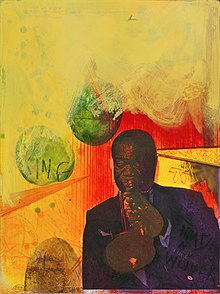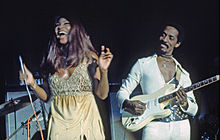User:Wildlandpixie/New sandbox
African-American Music Appreciation Month[edit]
African-American Music Appreciation Month is an annual celebration of African-American music in the United States. It was initiated as Black Music Month by President Jimmy Carter who, on June 7, 1979, decreed that June would be the month of black music.
Origin History[edit]

The origins of African-American Music Appreciation Month can be traced back to the late 1970’s and the creation of the Black Music Association in 1978. The organization was composed of black music executives with the goal of celebrating black-musicians’ accomplishments, and ensuring black artists had an equitable share of profits from the industry.[1] One of the association's first actions was the creation of “Black Music Month” in June 1978. The initiative was designed as an economic plan to help boost the notoriety and profitability of black musicians and was advertised through the slogan “Black Music Is Green”.[1] After the Country Music Association, and “Country Music Month”, was honored at the White House, members of the Black Music Association began to reach out to the White house for a similar endorsement.[1]
On June 7th ,1979, President Jimmy Carter invited the Black Music Association to the White House as part of a celebration of black music. During the event, President Carter spoke of the important contributions of black musicians to society and decreed that June would be the month of black music.[1] However, President Carter did not issue any Presidential Proclamation to codify the event.[2]
It wasn’t until the 1990’s that Dyana Williams, co-founder of the International Association of African American Music Foundation (IAAAMF), discovered that President Carter never signed an official Presidential Proclamation, and as such, the event was mostly symbolic. Williams reached out to then President Bill Clinton’s administration, who encouraged her to work with congress to form legislation certifying the event in law.[2] After obtaining bi-lateral support from both parties, House Resolution 509, sponsored by Representative Chaka Fattah of Pennsylvania was introduced in the U.S. House of Representatives.[3] The resolution passed into law [3] and was subsequently signed by President Bill Clinton.[2] In addition to codifying the event into law, the bill rebranded the event from “Black Music Month”, to “African-American Music Month”.[3]
In June 2009, President Barack Obama issued a Presidential Proclamation that rebranded the event to its current name of “African-American Music Appreciation Month”.[4]
Recent History[edit]
On May 29th of 2020, President Donald Trump issued a presidential proclamation re-affirming June as African-American Music Appreciation month. In his statement, President Trump talked about the change that African American music has fostered. [4] The proclamation argued how African-American music has been a been a powerful platform to address the pain and injustices the black community has faced throughout history. President Trump encouraged all citizens of the United States to spend the month of June appreciating and educating themselves on the impact of African-American Music, and it's impact on history[5].

In the recent history of African American Music Appreciation month, President Donald Trump has tweeted his love for music by black creators, specifically those who stand behind him as president, including artists like Kanye West. Trump has made it very clear that he supports the people of the African American Music Appreciation month as long as they support him. Although President Trump voiced excitement about the start of June for African-American Music Appreciation month, he did not voice the same excitement when speaking of some of the black artists that are a part of the African American Music Appreciation, artists include Beyoncé and Jay-Z. Due to Beyoncé and Jay-Z’s choices to not only speak out about the injustices that black people have faced throughout history, but to also speak out about their opinions on how Trump enforces those same injustices, they have been bashed by the president, who claims their music to be vulgar and crude.
In the year of 2020, America was told to celebrate African American Music Appreciation month, given this is a very lovely thing one can do during a global pandemic, America listened and praised those of the Black Community who have used their talents to raise awareness of African American culture and history.
Popular Genres[edit]
The identity of African American music began with the enslavement of people kidnapped from Africa and the Caribbean.[6] Those enslaved used music to lift spirits during long days working on plantations and to form community among the people that were enslaved together.[7] This music was heavily influenced by music and song from the areas they were taken from.[8] Songs that enslaved people sang during the work day were the beginnings of the call and response technique that would remain as a staple of African American music through the years.[9] Song was also used to build community in private among enslaved people; worship and spirituality were the cornerstone of these songs.[10]

After exiting the time of slavery and the still largely discriminatory time of emancipation, African Americans struggled for a place in popular music.[11] Once new opportunities and spaces arose for African American musicians came about, music genres such as blues and jazz became popular among the African American community.[12] The rise of African American artists and musicians were possible in large part due to the Harlem Renaissance, a movement that took place in New York in the 1920s.[13] Artists such as Louis Armstrong rose to stardom during the Harlem Renaissance and went on to influence mainstream music.[14]
Gospel music became largely impactful to African American communities following the rise of blues music among the community.[15] The style of Gospel music is celebratory of the ecclesiastic style of music embraced by African Americans attending church in the south, often incorporating community participation during songs along with a call-and-response reliant harmony. [16] Popular artists such as Mahalia Jackson helped to increase the reach of Gospel music past African American communities to mainstream white communities throughout the United States.[1]
Influenced by the jazz and blues songs that came before, Rhythm & Blues or R&B became widely embraced by African American musicians. [17] R&B combined popular aspects of both genres of jazz and blues to create a new, smooth sound. Following the rise of popular R&B music, rock and roll became a popular genre for African American communities, and eventually popular in mainstream media.[18] Most of mainstream rock and roll was inspired by the influential African American artist Sister Rosetta Tharpe's sound and style of dance.[19]
Gospel music found a resurgence during the Civil Rights Movement, when black communities gathered in churches to come together despite the discriminatory state of segregation in the country.[20] The spirit of the songs during this time were rooted in uplifting those in the African American community using scripture and hymns from the Bible.[21] The passing of the Civil Rights Act in 1964 was the beginning of great advancements for African American musicians as they were now allowed in all spaces within the music industry.[22]
What followed in the time after was the rise of sounds heard in Hip Hop and Rap music.[23] Popular among young African American communities in big cities such as New York City or Chicago, Hip Hop and Rap allowed for a freestyle technique for young musicians.[24] The rise of Hip Hop and Rap music has allowed for the success of many African American groups and artists, including MC Lyte and and Run DMC, and continues to influence modern popular music artists.[25]
Lifetime Achievement Awards[edit]
A special award is given to musicians and singers who clearly influence their genre of music, the musicians around them, and the future generations of performers. This award is called the Lifetime Achievement Award or the Special Merit Awards.[26] It is presented by the Recording Academy’s National Board of Trustees. After the honorees are selected each year, the Recording Academy begins to collect information about them from family members, known friends, and other coworkers.[27] They use these interest pieces to paint a complete picture of the singer to use within the televised Grammy Award Celebration and to put on their website for everyone to read and enjoy.

Each year several performers are chosen to receive this award either in their lifetime or posthumously. The performers chosen are diverse and often include many African-American singers. The awards are given to musicians and singers as mixed in styles as Louis Armstrong awarded in 1972 to Jimi Hendrix awarded in 1992 to Michael Jackson awarded in 2010. More notable honorees of the Lifetime Achievement Award include: Duke Ellington awarded in 1966, Ella Fitzgerald awarded in 1967, Ray Charles awarded in 1987, Nat "King" Cole awarded in 1990, Miles Davis awarded in 1990, Stevie Wonder awarded in 1996, Aretha Franklin awarded in 1994, and Diana Ross awarded in 2012.[28]
In 2018 the President of the Recording Academy called the seven people honored that year with a Lifetime Achievement Award “a prestigious group”.[26] It included the Queen of Rock and Roll, also known as Tina Turner, and the Fathers of Funk, also know as The Meters. The President went one to explain more about Lifetime Achievement Award winners as well known in popular culture and they are inventive performers with vision. Also, these musicians and singers are being acknowledged by this award for their many achievements in music, both by directly impacting and by inspiring their contemporaries and future musicians and singer.
Another notable, and more recent, Award African-American singer and winner of the 2020 Lifetime Achievement is Public Enemy.[29] Their music includes strong political undertones that advocates for the rights of African-Americans across the country, such as in their song Fight The Power. Other noteworthy African-American singers taking on social justice through music lyrics include Mahalia Jackson, Aretha Franklin, and James Brown.[30]
- ^ a b c d e "How Black Music Month Started As A Power Play". Vibe. 2019-06-07. Retrieved 2020-11-11. Cite error: The named reference ":0" was defined multiple times with different content (see the help page).
- ^ a b c Williams, Brennan (2014-06-03). "The Real Reason Why We Celebrate Black Music Month". HuffPost. Retrieved 2020-11-11.
- ^ a b c Fattah, Chaka (2000-06-06). "Text - H.Res.509 - 106th Congress (1999-2000): Recognizing the importance of African-American music to global culture and calling on the people of the United States to study, reflect on, and celebrate African-American music". www.congress.gov. Retrieved 2020-11-11.
- ^ a b "African-American Music Appreciation Month | The White House". web.archive.org. Retrieved 2020-11-11.
- ^ "African-American Music Appreciation Month, 2020". Federal Register. 2020-06-05. Retrieved 2020-11-13.
- ^ "Roots of African American Music".
- ^ "African American Song".
- ^ "Roots of African American Music".
- ^ "Roots of African American Music".
- ^ "African American Song".
- ^ "African American Song".
- ^ "The History of African American Music".
- ^ "Harlem Renaissance".
- ^ "Harlem Renaissance".
- ^ "African American Song".
- ^ "African American Song".
- ^ "African American Song".
- ^ "African American Song".
- ^ "50 Most Important African American Music Artists of All Time".
- ^ "African American Song".
- ^ "African American Song".
- ^ "African American Song".
- ^ "African American Song".
- ^ "African American Song".
- ^ "Celebrating Black Music Month".
- ^ a b "HAL BLAINE, NEIL DIAMOND, EMMYLOU HARRIS, LOUIS JORDAN, THE". GRAMMY.com. 2018-01-08. Retrieved 2020-11-11.
- ^ "Lifetime Achievement Award: Roy Haynes". GRAMMY.com. 2014-12-02. Retrieved 2020-11-11.
- ^ "Lifetime Achievement Award". GRAMMY.com. 2010-10-18. Retrieved 2020-11-11.
- ^ "CHICAGO, ROBERTA FLACK, ISAAC HAYES, IGGY POP, JOHN PRINE, P". GRAMMY.com. 2019-12-18. Retrieved 2020-11-11.
- ^ "Artists Who've Amplified Social Justice Movements". GRAMMY.com. 2020-07-02. Retrieved 2020-11-11.
